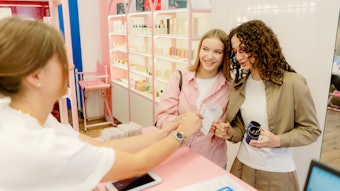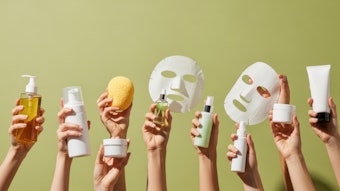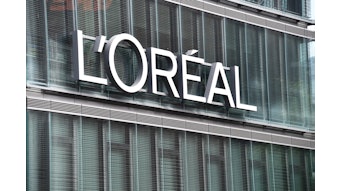Green has always been “in” in India. Because of the country’s Ayurvedic heritage, there has always been an emphasis on using natural products and herbs for beauty care. Traditional home beauty recipes have been passed down through generations, defining key beauty regimens for most men and women in India, but the market opened up in the mid-1990s when consumers’ buying capacity increased, welcoming packaged beauty products that were not necessarily nature-based. At the time, consumers were hardly discerning, and using at-home beauty recipes was considered down-market. While this new buying pattern trickled down to smaller cities across the country, consumers in the more rural areas continued to supplement their packaged creams and lotions with at-home recipes. Culturally, they never completely trusted imported brands or products with synthetic ingredients.
The scene is changing again. Over the last two to three years, there has been a movement among elite and mid-range buyers to seek out beauty care products that are made from natural ingredients and fewer preservatives, in part, due to consumers becoming more informed and questioning the manufacturing process behind every brand. There is also a growing concern about the chemicals that are put into beauty care, cosmetics and toiletries.
Back to Nature
According to a report by Euromonitor International, since 2006, products based on natural ingredients have become part of mainstream offerings. This is a global phenomenon that is being driven by increased focus on health and well-being, and a rising awareness regarding allergies and the perception of health risks from chemical exposure (Euromonitor pegs the number of chemicals the average consumer is exposed to in the course of daily grooming at 170). While natural beauty products never really went out in the Indian market, there is a new glamour in using nature-based or organic beauty products. Consumers who purchase natural or organic beauty products in India seem to do so in order to make a statement about their lifestyle.
“When I started Aroma Magic as a brand, it was to promote the concept of natural beauty care amongst my clients,” said Blossom Kochhar, founder and director of Aroma Magic, an Indian aromatherapy-based beauty brand. “In those days, people were into using creams and lotions that had too much synthetic stuff in them. But that has changed; my clients are very conscious of pollutants and chemicals that enter their system, so they seek products that are nature-based. This is one of the reasons why spa therapies have become big, simply because fresh herbs and natural ingredients are used to deliver the treatments. More than a beauty statement, using organic products for rejuvenation has become a lifestyle statement for the consumers today.”
Indian consumers also perceive natural-based products as having long-term beneficial impact on skin and hair.
Commercial Opportunity
The growing awareness among young Indians about health, wellness and beauty as important aspects of life translates to growth opportunities for natural beauty product manufacturers and marketers. According to a report in The Times of India, a leading Indian daily, young Indian consumers are willing to spend more on eco-friendly products and natural beauty products because they feel they are doing something beneficial for themselves. “Today, for the goodness of natural ingredients, most of our clients do not mind paying a premium. It always good to know what you are putting on your skin,” says Yatan Ahluwalia, director, Y&S Style Media, the Indian importer of organic beauty care brand Susan’s Soaps & More.
The growth of the Indian spa and eco-tourism industries is also a boon for organic beauty care companies. (See “Indian Spas,” GCI magazine June 2007 and online.) With the increasing global awareness of organic beauty, both business and tourist travellers like to pick up beauty products with natural ingredients from Indian spas and stores. In fact, Indian brands such as Forest Essentials and Khadi (an Indian government initiative to promote cottage industry that has upgraded its beauty product offerings) cater to this segment.
Sellers Market
For Indian consumers, there have always been indigenous brands built on natural-based beauty care. Multinationals’ embrace of the trend is a sign that natural and organic ingredients-based beauty products are here to stay. Over the last year, indigenous Indian natural beauty brands have also started to build brand awareness through new campaigns, redesigned product packaging and updated formulas. They all claim to offer safe, efficacious and natural solutions by synthesizing traditional Ayurvedic recipes and herbs with modern science. Dabur India, one of India’s leading fast-moving consumer goods companies, is playing up its herbal heritage to help grow its masstige personal care brand Vatika across popular product categories. “We have already built a platform for Dabur to be seen as a company with Ayurvedic heritage. Indian consumers still largely believe in using natural homemade beauty recipes,” said Vikas Mittal, vice president, personal care, Dabur India, who further notes that the company is simply offering these accepted and traditional hair care, skin care and bath products in a more convenient and portable format.
The company is in the process of expanding various product category lines under this brand with a message playing on Indian beauty traditions—“delivering the goodness of nature in a pleasurable form.” According to Mittal, all the products are specially enriched with natural extracts from herbal ingredients such as amla, henna, almond, coconut and lemon. Similarly, the brand Jovees by JR Herbals, a recently launched herbal beauty company, is making the same promise. Rakesh Misri, business head, JR Herbal Care India Limited, says that Indian consumers have become very discerning about their skin’s needs and only pick up products that offer true benefits. “At Jovees, we constantly innovate to bring out the curative properties of the natural ingredients in our products.”
Besides national brands, each regional market has its own natural beauty brands, often marketed by beauty therapists and salons, and high-end brands and retailers such as The Body Shop, Clarins, Lush and L’Occitane have made their presence felt in the market. While Lush continues to sell from Bangalore, The Body Shop is rapidly increasing its presence in every region in the country, especially in urban areas, and L’Occitane has begun opening brand stores in Mumbai and Delhi.
New Growth Areas
Some Indian companies are taking natural beauty further, launching makeup and color cosmetics souped up with natural ingredients. Best-selling brands that claim to be 95% natural include Lotus Herbals, Himalaya Herbals, Shahnaz Husain and Biotique.
“We have been a prime player in the Indian natural and Ayurvedic beauty care market for the last 10 years. We have been focusing on skin and hair care ’til now. But over the last few years, we started getting requests from our 400-odd beauty counters across the country for color cosmetics,” said Nitin Passi, director, marketing and sales, Lotus Herbals. “To be precise, the market and consumer demand for nature-based cosmetics that [do] not harm their skin is what prompted us to create Cosmetics Ecologique.”
The line was developed from pigments that are 100% vegetarian and natural, and include natural active sun protection. Lipsticks are made from floral wax and essential oils, and Lotus Herbals’ eye shadows are made from botanical extracts and minerals, kajals from almond oil and camphor. The company promotes ethical products at affordable price ranges as its unique sales position, but Passi notes that these elements cannot negatively impact the qualities that consumers expect in a cosmetic product. In addition to the natural positioning, Lotus Herbals also focuses, for example, on delivering vivid colors and texture throughout its toluene-, DBP- and acetone-free nail enamel line.
Market Opportunity
With the increasing demand for natural-based products, there’s a two-way business opportunity for both Indian and international manufacturers. India is known as a popular source for raw ingredients due to its rich mountain flora. Along with sourcing natural ingredients, Indian contract manufacturers are adept at developing specific natural beauty products—and this is a trend gaining momentum. Local brands such as Lotus Herbals and JR Herbals also contract manufacture natural beauty products for clients in the international market—including the U.S., Europe and the Middle East. And the opportunity to market naturals in India is not waning. The strong brand awareness among consumers ensures market potential for organic and natural beauty brands ready to invest in the Indian market.










